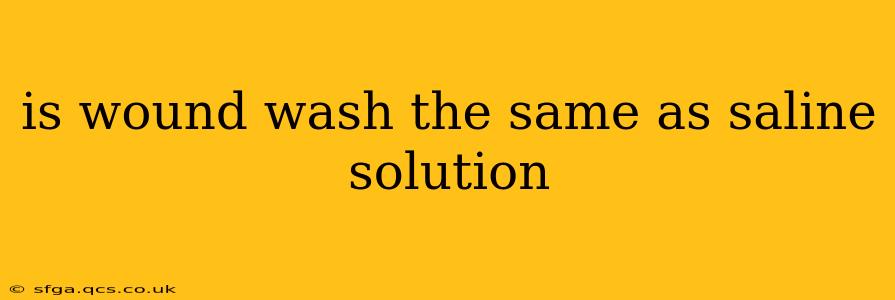Is Wound Wash the Same as Saline Solution? Understanding the Differences
The short answer is: not exactly. While many wound washes contain saline solution (sterile sodium chloride), they are not always the same thing, and using the terms interchangeably can be misleading. This article will clarify the distinctions and help you understand which solution is appropriate for different wound care situations.
What is Saline Solution?
Saline solution is a simple solution of sterile water and salt (sodium chloride), mimicking the body's natural electrolyte balance. Its primary use is to hydrate and flush, making it suitable for many medical applications, including wound cleansing. However, it's crucial to note that commercially available saline solutions are designed for various uses; not all are appropriate for wound care. Always ensure the saline solution is specifically labeled for wound irrigation or is sterile to prevent infection.
What is Wound Wash?
Wound wash is a broader term encompassing various solutions designed specifically for cleaning wounds. While many wound washes contain saline as their primary ingredient, they can also include additional components to promote healing and prevent infection. These additions might include:
- Antiseptics: These agents kill or inhibit the growth of microorganisms, reducing the risk of infection. Common examples include povidone-iodine and chlorhexidine. However, overuse of antiseptics can damage healthy tissue, so they should be used judiciously and as directed by a medical professional.
- Anesthetics: Some wound washes contain local anesthetics to reduce pain during cleaning.
- Other Active Ingredients: Depending on the specific wound wash, other ingredients might be added to aid in tissue repair or manage inflammation.
Therefore, while a saline solution might be a component of a wound wash, a wound wash is rarely just saline.
What are the Different Types of Wound Washes?
The market offers various wound washes, each tailored for specific wound types and purposes. It's important to consult a healthcare professional to determine the most suitable option for your individual needs. Examples of different types include:
- Sterile Saline Irrigation Solution: This is the simplest form of wound wash, containing only sterile saline and nothing else. It is suitable for simple, uncomplicated wounds with minimal debris.
- Antiseptic Wound Washes: These contain antiseptics to help fight infection in wounds with a higher risk of contamination.
- Wound Cleansers with Debriding Agents: These are formulated to help remove dead tissue (debridement) from wounds, facilitating healing.
What is the Best Way to Clean a Wound?
The best approach to wound cleaning depends heavily on the wound's type, severity, and location. For minor cuts and scrapes, gentle cleaning with soap and water followed by a sterile saline rinse is often sufficient. However, for more serious wounds or wounds showing signs of infection, it's crucial to seek medical attention. Improper wound care can lead to complications, so professional guidance is always advisable.
Can I Use Saline Solution to Clean a Wound?
Yes, sterile saline solution can be used to clean minor wounds, but it's not always the best option. For deeper wounds, or if you're unsure about wound care, consult a medical professional. Using plain saline may not be sufficient to address debris or infection.
What are the potential risks associated with using Saline solution to clean wounds?
While generally safe, using non-sterile saline to clean a wound can introduce bacteria, potentially causing infection. Moreover, saline alone might not effectively remove all debris from a wound, potentially hindering healing. Always use sterile saline intended for wound irrigation.
This information is for general knowledge and does not constitute medical advice. Always consult a healthcare professional for any concerns regarding wound care.
